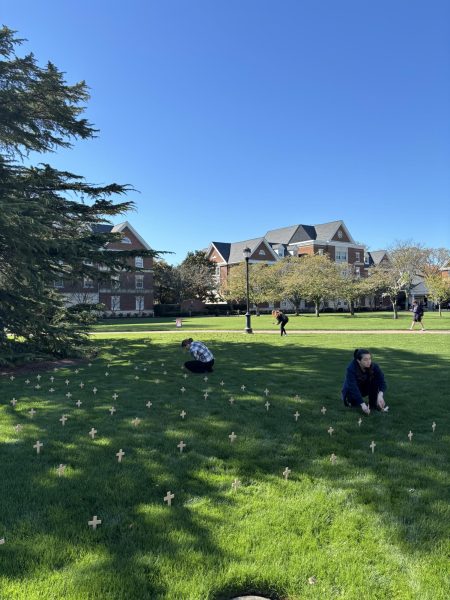State Required Anti-Hazing Training Skips Over Athletic Teams
University Administrators explain requirements of Adam’s Law on campus
Back in January of 2022, Adam’s Law was passed to protect college students from hazing and to create a precedent for legal responsibility in the event of hazing. Under this new legislation, anyone found guilty of hazing in the state of Virginia is also guilty of a Class 1 misdemeanor, one step below a felony (stophazing.org). Also under this new legislation, “Each institution shall provide to each current member, new member, and potential new member of each student organization with new members hazing prevention training that includes extensive, current, and in-person education about hazing.” (lis.virginia.gov).
Since the bill was passed, Christopher Newport University (CNU) has presented the required anti-hazing training to various student organizations. On-campus student organizations include all Greek Life organizations, as well as organizations like Knights of the Force and the SGA. However, another on-campus group that consistently has new members entering each academic year is CNU Athletics. Questions arose regarding the anti-hazing training received by athletic teams, or if they received training at all. Why is it that athletic teams are identified alongside Greek organizations and other student groups as frequent culprits of hazing, according to the Gordie Center, yet athletic teams are not required to attend the same Anti-Hazing Training as the other organizations?
As pointed out by Kevin Hughes, the Vice President of Student Affairs, athletic teams were never included in the Adam’s Law legislation requiring student organizations with new members to receive anti-hazing training. In fact, athletic teams are explicitly excluded from the training. When defining “student organization with new members,” officials indicated that this “does not include any varsity intercollegiate or club athletic team” (lis.virgnia.gov).
Hughes stated that all freshmen receive anti-hazing training at a session during orientation: “We capture potential new members who also happen to be athletes, band members, and any other student interested in joining any sort of student organization.”
Director of Athletics, Kyle McMullin, confirmed Hughes’ statement, and also indicated extra training that athletes receive: “[Student-athletes] also receive additional training when the Director of Title IX speaks to our student-athletes at the beginning of each academic year and specifically addresses hazing in her talk.”
McMullin made his stance clear: “Our expectations are quite simple: We do not condone hazing. Our coaches and staff have a clear understanding that while we expect to compete at a very high level, the best avenue to doing so is by creating teams that support each other and don’t engage in destructive behavior.”
However, despite the claims that student-athletes receive anti-hazing training, some may wonder, is it enough? According to the presentation shared by CNU in its Anti-Hazing Training for student organizations with new members, the Gordie Center includes athletic teams in its list of hazing culprits. According to the National Collegiate Athletic Association (NCAA), 74% of student athletes experience at least one form of hazing during their college years. The most frequent form of hazing is related to alcohol, specifically drinking games (ncaa.org).
The policy for athletic organizations and their athletes set by the NCAA states: “Athletics administrators, coaches and student-athletes need to work together to develop anti-hazing policies which promote healthy team activities and avoid practices that humiliate members. All student-athletes and members of the department must be educated on the policy annually.”
In accordance with state law, the Center for Honor Enrichment and Community Standards (CHECS) must publicly report any incidents where an individual or organization was found responsible for hazing within the past calendar year. The CHECS Director, Alyssa Reddy, was proud to report zero violations for the 2021-2022 academic year.
If a report has to be made, according to state law, the report must include: the name of the student organization, the date the hazing incident occurred, the date the investigation was initiated and concluded, the date the organization was found responsible for the hazing incident, and a comprehensive description of the incident, including the findings, charges, and sanctions placed on the organization that does not reveal personal, identifying information.
All reports can be found at cnu.edu/public/hazing/. It should be noted that incidents where an accusation of hazing was made, but no one was found responsible, are not required to be shared.
Your donation will support the student journalists of Christopher Newport University. Your contribution will allow us to purchase equipment and cover our annual website hosting costs.





